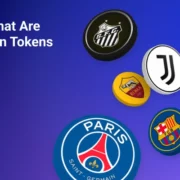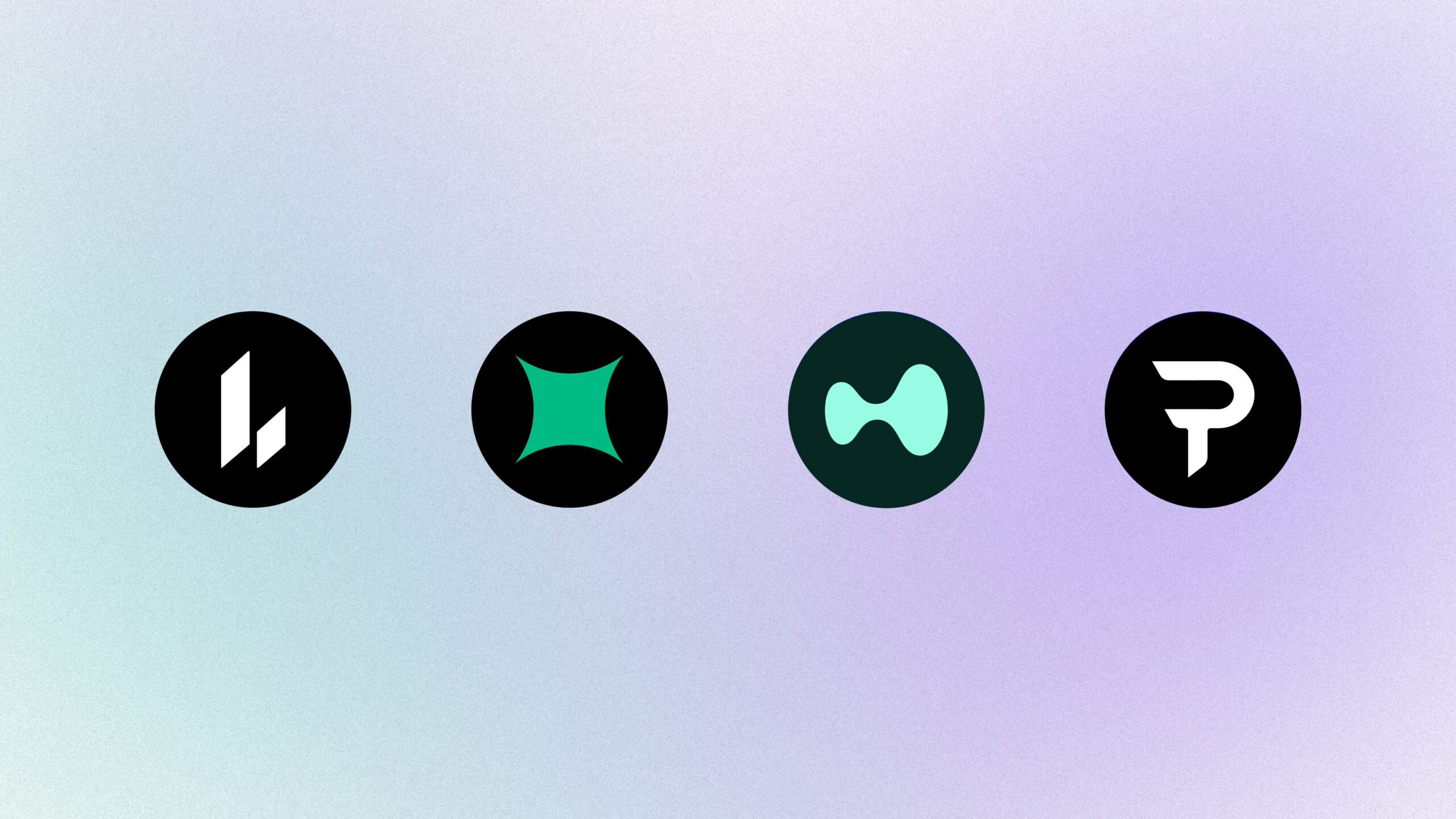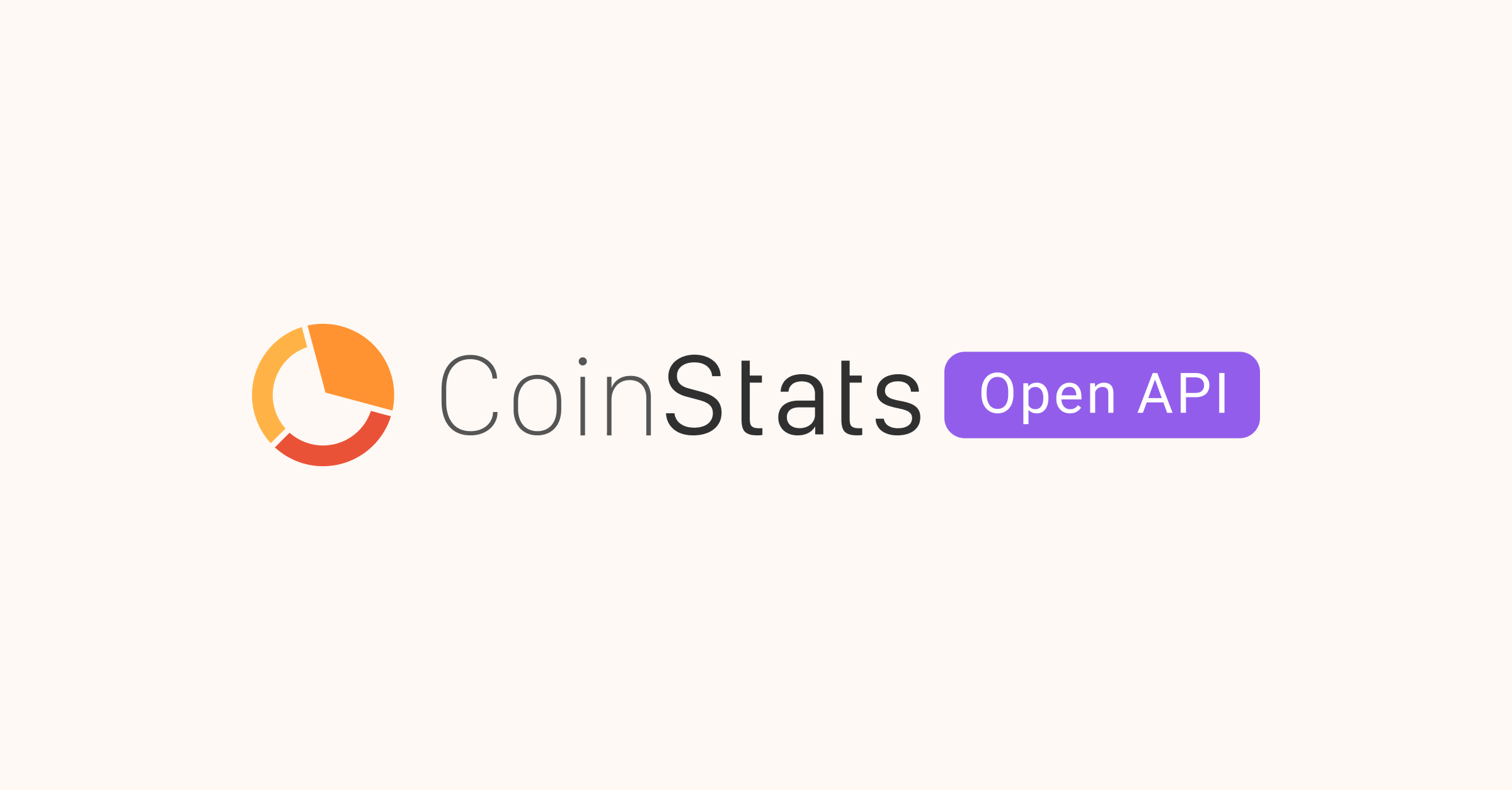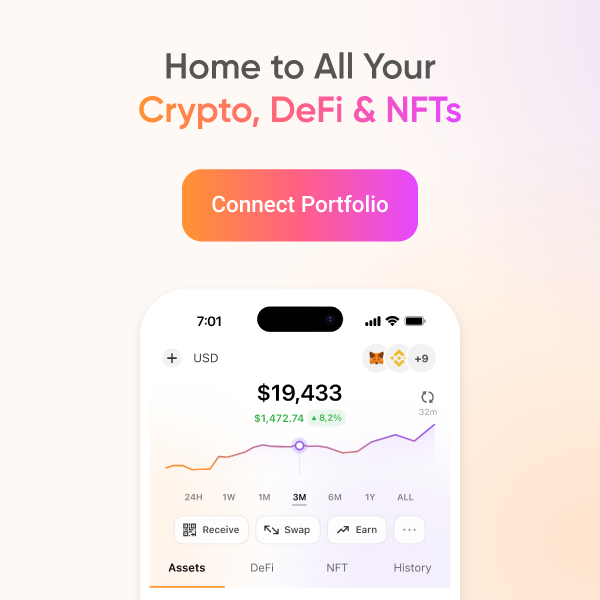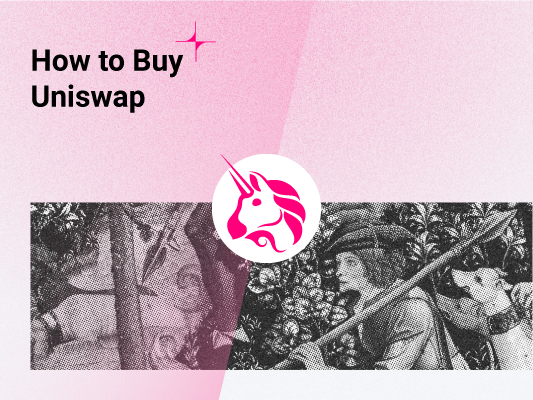
How to Buy Uniswap (UNI)
Uniswap is an innovative decentralized exchange protocol built on Ethereum. It aims to solve decentralized exchanges’ liquidity problem by allowing the exchange platform to swap tokens without relying on buyers and sellers creating that liquidity. Uniswap incentivizes Uniswap users to maintain the exchange’s liquidity, providing portions of the transaction fees and newly minted UNI tokens to those who participate.
UNI is the token for Uniswap. It’s a governance token, so owners can participate in decisions on network upgrades and policies, with each vote being proportional to the amount of UNI cryptocurrency they stake.
Read on to learn everything you need to know about the Uniswap project, the UNI token, and how to start investing in UNI.
Step #1: Select a Crypto Exchange
Uniswap (UNI) tokens are available on a growing number of cryptocurrency exchanges. Visit the market page on CoinStats to view the exchange platforms supporting UNI. Compare the exchanges’ security, user experience, fee structure, supported crypto assets, etc., to choose the one with the features you need, such as affordable transaction fees, top-notch security, high trading volume, an intuitive platform, round-the-clock customer service, etc. Also, consider whether the cryptocurrency exchange is regulated by the Financial Industry Regulatory Authority (FINRA) and allows you to buy UNI using your preferred payment method.
To trade cryptocurrencies, you must use a centralized or decentralized crypto exchange, so let’s look into the details of each type below.
Centralized Exchange
A centralized crypto exchange or CEX, such as Coinbase, eToro, Binance, etc., functions as a middleman between buyers and sellers and charges specific fees for using their services. Most crypto transactions are conducted on centralized exchanges, allowing users to buy and sell cryptocurrencies for fiat currencies such as the US dollar or digital assets like BTC and ETH. Centralized exchanges require their users to follow KYC (know your customer) and AML (anti-money laundering) rules by providing some information and personal identification documents. However, the drawback of trading on a CEX is that it’s highly vulnerable to hacking or cybersecurity threats.
Decentralized Exchange
On the other hand, a decentralized exchange (DEX), like Uniswap, SushiSwap, Shibaswap, etc., is a non-centralized alternative to a centralized exchange and isn’t governed by any central authority. Instead, it operates over blockchain and charges no fee except for the gas fee applicable on a particular blockchain, i.e., on the Ethereum blockchain. Decentralized exchanges use smart contracts to let people trade crypto assets without needing regulatory authority. They deploy an automated market maker to remove any intermediaries and give users complete control over their funds. This method is safer since no security breach is possible. However, decentralized exchanges are less user-friendly in terms of interface and currency conversion. For instance, they don’t always allow users to trade crypto with fiat currency; users have to either already own crypto or use a centralized exchange to get crypto. Another drawback of decentralized exchanges is that it has failed to achieve liquidity levels comparable to centralized exchanges. It also takes longer to find someone looking to trade with you as DEX engages in peer-to-peer trade, and if liquidity is low, you may have to accept concessions on price and quickly sell or buy low-volume crypto.
You can list anything on a DEX, which means you have access to new, in-demand assets while also taking on more risk.
Step #2: Create an Account
After you’ve chosen a cryptocurrency exchange that suits your investment needs, you must register with the exchange using a valid email or mobile number. A link will be sent to your address, and you must click it to verify your account. Once the account is activated, you must create an elaborate password, and you’re good to go.
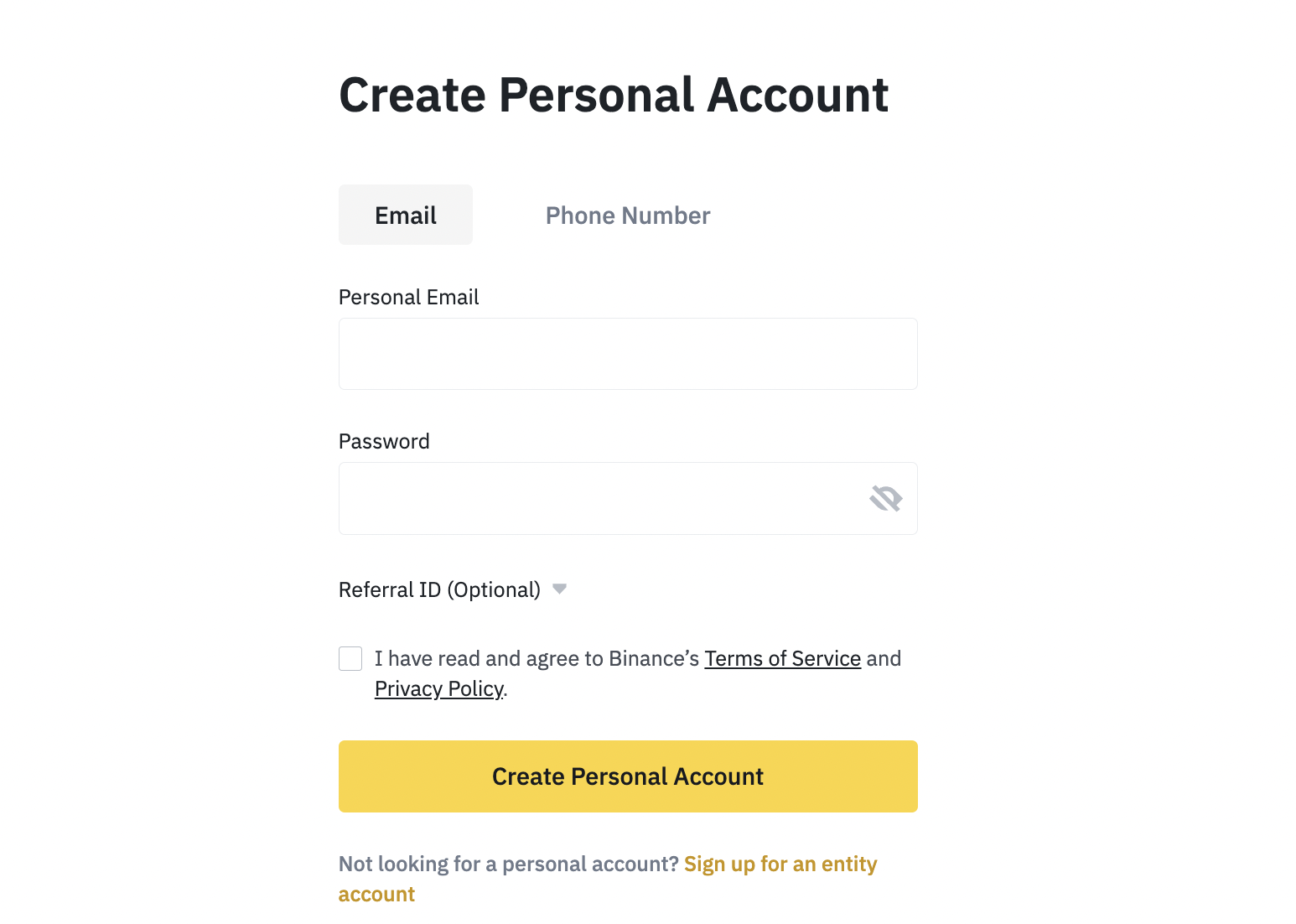
Some exchanges have strict KYC and AML requirements, and in order to get verified, you must provide personal information such as:
- Full name
- Residential address
- Date of Birth
- ID Document.
In some cases, you might also need to upload a selfie or undergo video verification to finalize the verification process.
Once your identity verification is complete, it’s recommended to activate two-factor authentication (2FA) for an extra layer of security.
Step #3: Deposit Funds
The next step is to deposit funds into your account. Many crypto exchanges support fiat currencies like USD, EUR, etc. Simply select your preferred deposit method, such as a bank transfer, wire transfer, credit or debit cards, e-wallets, PayPal, etc., and the currency you wish to deposit. Tap on “Deposit Funds,” enter the amount you want to deposit and click “Deposit.”
Some deposit methods are extremely fast, while others, depending on the amount, require confirmation from authorities. Remember to evaluate the fees of different deposit methods since some have larger fees than others.
- Credit or Debit Card
Linking your debit card to your crypto account is advantageous as it lets you make instant or recurring purchases, but be aware that it attracts an additional fee.
- Bank Account
It’s usually free to make a bank transfer from your local bank accounts, but you should still double-check with your exchange.
- Cryptocurrency
UNI can be traded for another cryptocurrency or a stablecoin; the trading pairs vary between exchanges. So, you must search for UNI on the spot market to select a pair from the list of available trading pairs.
Step #4: Buy UNI
Follow the steps below to place a market order to buy UNI instantly at the current market price:
- Click the search bar, enter UNI, and select “Buy UNI” or the equivalent.
- Select a trading pair you wish to buy UNI against.
- Choose the payment method, the currency you wish to use, and input the amount of UNI or the fiat amount to be spent. Most exchanges will automatically convert the amount to show you how many UNI tokens you’ll get.
- Double-check the transaction details and click “Confirm.”
- The UNI tokens will be displayed in your balance once the transaction is processed.
You can also place a limit order indicating that you want to buy UNI at or below a specific price point. Your broker will ask you the number of coins you wish to acquire and the maximum price you’re ready to pay for each once you’ve placed an order. The coins will only appear in your wallet if your broker fulfills your order at or below your requested pricing. The broker may cancel your order at the end of the day or leave it open if the price increases over your limit.
If you’re planning to keep your newly purchased coins for an extended period, we highly recommend securely storing them in a hardware wallet.
To trade UNI on spot markets, go to the Trade page and search for the UNI pairs ( UNI/USD or UNI/USDT). Select the trading pair and check the price chart. Click “Buy UNI,” select the “Market,” enter your amount or choose what portion of your deposit you’d like to spend by clicking on the percentage buttons. Confirm and click “Buy UNI.”
Congratulations on adding Uniswap (UNI) tokens to your crypto portfolio!
How to Buy UNI on CoinStats?
Did you know that you can buy UNI directly on CoinStats with 0 additional fees? It’s super quick and secure and allows you to buy crypto with your credit card right where you track and manage it. Here’s how you can buy UNI on CoinStats on web and mobile in a few simple steps.
- Head over to the CoinStats homepage
- Navigate to the Cryptocurrencies tab in the menu bar above and pick your desired cryptocurrency.
- Click Buy Crypto
- Select a portfolio or add a wallet address where the funds will be deposited
- Choose MoonPay as the provider
- Add the credentials of your payment method
- Complete the payment
Store UNI
While your UNI tokens can be stored in your brokerage exchange wallet, experts highly recommend storing your precious coins away from exchange wallets, as those might be susceptible to hacks and interference.
We highly recommend creating a private wallet with your own set of keys. Depending on your investing preferences, you might choose between software and hardware wallets:
Software Wallets
If you’re looking to trade UNI regularly, software or hot wallets provided by your selected crypto exchange will suit you. The strength of software wallets lies in their flexibility and ease of use. A software wallet is the most easy-to-set-up crypto wallet and lets you easily interact with several decentralized finance (DeFi) applications. However, these wallets are vulnerable to security leaks because they’re hosted online. So, if you want to keep your private keys in a software wallet, conduct due diligence before choosing one to avoid security issues. We recommend a platform that offers 2-factor authentication as an extra layer of security.
Examples of software wallets include CoinStats Wallet, MetaMask, Coinbase Wallet, Trust Wallet, and Edge Wallet, amongst others.
Hardware Wallets
Hardware or cold wallets are usually considered the safest way to store your cryptocurrencies as they offer offline storage, thereby significantly reducing the risks of a hack. They are secured by a pin and will erase all information after many failed attempts, preventing physical theft. Hardware wallets also let you sign and confirm transactions on the blockchain, giving you an extra layer of protection against cyber attacks. These are more suitable for experienced users who own large amounts of tokens.
Ledger hardware wallets are arguably the most secure hardware wallets letting you securely manage your digital assets. The Nano X is designed for advanced users and offers more storage space and advanced features than Ledger Nano S, designed for crypto beginners.
A hardware wallet is more expensive than a hot wallet, with prices ranging between $50 – $200.
Examples of cold wallets are Trezor Model T, Ledger Nano X, CoolWallet Pro, KeepKey, Ellipal Titan, and SafePal S1, amongst others.
Bonus Step: Track UNI Tokens
The crypto market is volatile, and managing your portfolio could get tricky if you hold multiple assets. Utilizing a portfolio tracker will help you keep track of your UNI tokens and all your crypto investments from one platform at all times. CoinStats offers one of the best crypto portfolio trackers in the market; you can find more information here.
You can also monitor the profit, loss, and liquidity of UNI across several exchanges on CoinStats.
CoinStats supports over 250 cryptocurrency exchanges and over 7,000 cryptocurrencies. It offers charting tools, analytical data, advanced search features, and up-to-date news. Here you have the opportunity to connect an unlimited number of portfolios (wallets and exchanges), including:
- Binance
- MetaMask
- Trust Wallet
- Coinbase
- Kraken
- Kucoin
- Bitstamp and 500 others.
To connect, go to the CoinStats Portfolio Tracker page and:
- Click Add Portfolio and Connect Wallet.
- Click the wallet you want to connect to (e.g., Ethereum Wallet).
- Input the wallet address and press Submit.
What Is Uniswap (UNI)?
Uniswap is a decentralized exchange or DEX working on the Ethereum blockchain. It was launched in 2018 and is the second-biggest cryptocurrency program in terms of market capitalization globally.
Uniswap is an Automated Liquidity Protocol for trading ERC20 tokens. In contrast to other exchanges, which take trading charges, Uniswap works for public welfare. It allows users to exchange tokens without any intermediaries, achieving a high level of decentralization.
Uniswap operates via contracts built into its protocol and utilizes an introductory numerical statement and supplies of ETH and tokens to do a similar task.
The protocol relies on liquidity providers creating liquidity pools that provide liquidity across the platform, allowing users to seamlessly swap between essentially any ERC-20 tokens without the need for an order book.
In contrast to a centralized exchange, there is no listing process on Uniswap. Any ERC-20 token can be launched for trading on the Uniswap platform as long as a liquidity pool is available. Uniswap does not charge any listing fees, making it essential for new or smaller ERC-20 projects.
Uniswap allows users to retain control of private keys, eliminating the risk of losing assets if the exchange is ever hacked.
Uniswap charges users a flat 0.30% fee for every trade on the platform and automatically sends it to a liquidity reserve.
When a liquidity provider exits, they receive a portion of the total fees from the reserve relative to their staked amount in that pool.
After the Uniswap v.2 upgrade, a new protocol fee was introduced that can be turned on via a community vote and sends 0.05% of every 0.30% trading fee to a Uniswap fund to finance future development. Currently, this fee option is turned off; however, LPs will start receiving 0.25% of pool trading fees if it’s turned on.
How Uniswap (UNI) Works?
Uniswap does not follow the centralized exchanges’ conventional engineering of advanced trade and works without an order book. It uses Constant Product Market Maker design, a variation of a common decentralized exchange model known as Automated Market Maker (AMM).
AMM are smart contracts that hold liquidity pools (reserves) that traders can exchange in trades. These pools are funded by incentivized liquidity providers.
Anyone who lends an equivalent value of two tokens in the pool is a liquidity provider. In return for their stake in liquidity pools, traders pay a fee to the pool distributed to liquidity providers according to their share of the pool.
These tokens can either be an Ethereum token and any ERC-20 token or two ERC-20 tokens. These pools are made up of stablecoins such as USDC, DAI, or USDT, yet this isn’t mandatory. LPs are rewarded with liquidity tokens based on their share of the entire liquidity pool.
Uniswap (UNI) is the asset that powers Uniswap. Its primary use case is as a governance token. Uniswap (UNI) tokens enable a decentralized payment method, providing more control over your money. UNI can also be used for speculation, investment, or as an alternative to expensive and slow international transfers. It can also contribute to an alternative financial system for people with access to smartphones but not a bank account.

Things to Know Before Buying Uniswap (UNI)
In addition to the information on Uniswap described above, there are a few more factors to consider before buying Uniswap (UNI):
Lending and Liquidity
Uniswap rewards users who lend their crypto to ensure there are sufficient funds in its liquidity pools.
When adding liquidity, you need to contribute equivalent amounts of both cryptocurrencies to the pool. In return for your contribution, Uniswap will pay you a share of the gas fees for that liquidity pool.
The idea is that users can earn tokens in exchange for providing the liquidity necessary to facilitate trades of a specific token pair on the platform.
Risk
Crypto assets are highly speculative, involve a high degree of risk, and can lose their value rapidly and significantly in the future.
So, make sure you understand the risks involved before buying Uniswap. Another potential problem with crypto trading is that regulators may try to put down decentralized finance, DeFi as a whole, which could negatively affect Uniswap.
This content and any information contained therein is intended for informational and educational purposes only, does not constitute a recommendation by CoinStats to buy, sell, or hold any security, financial product, or instrument referenced in the content, and does not constitute investment advice, financial advice, trading advice, or any other advice.
Uniswap: To Trade or Sell
After the purchase of your tokens, you’ll need to decide how to use them. You have three options: to hold, sell, or trade.
You have two options for selling your Uniswap tokens:
- You can sell your UNI tokens directly for dollars, with the option of withdrawing this money to your bank account or credit card.
- If your chosen platform does not allow a direct sale from UNI to fiat currency, you should exchange your Uniswap for Ethereum or Bitcoin, then transfer your ETH or BTC to a platform where you can convert these for dollars. You will then be able to transfer the money to your bank account or credit card.
To trade tokens on Uniswap, follow these steps:
- Connect your wallet. Connect to Uniswap using a wallet.
- Choose the token pair. Choose from available ERC-20 tokens on the “Swap” section of the website. You will need to choose both the token you are selling and the one you are buying.
- Review settings. Experienced traders can use the settings icon in the top left corner of the Swap interface to set slippage tolerance and maximum trade time.
- Swap. Click “Swap,” review the transaction (including Uniswap trading fees), and confirm it through your wallet (which will include Ethereum gas fees). After confirmation, the AMM model completes the rest of the transaction on the Ethereum blockchain, and you receive your new tokens into your wallet automatically.
Conclusion
The Uniswap project’s decentralization and open governance through its UNI token make it very popular. Uniswap’s liquidity pools are also attractive for investors who want to earn income on cryptocurrency staking. AMM procedures on Uniswap are permissionless, meaning there are no requirements to fulfill KYC criteria and no cyber attackers. Uniswap is user-friendly – the only thing you need to trade is an Ethereum wallet. Last but not least, there is no need to pay for token or coin listing tax.
